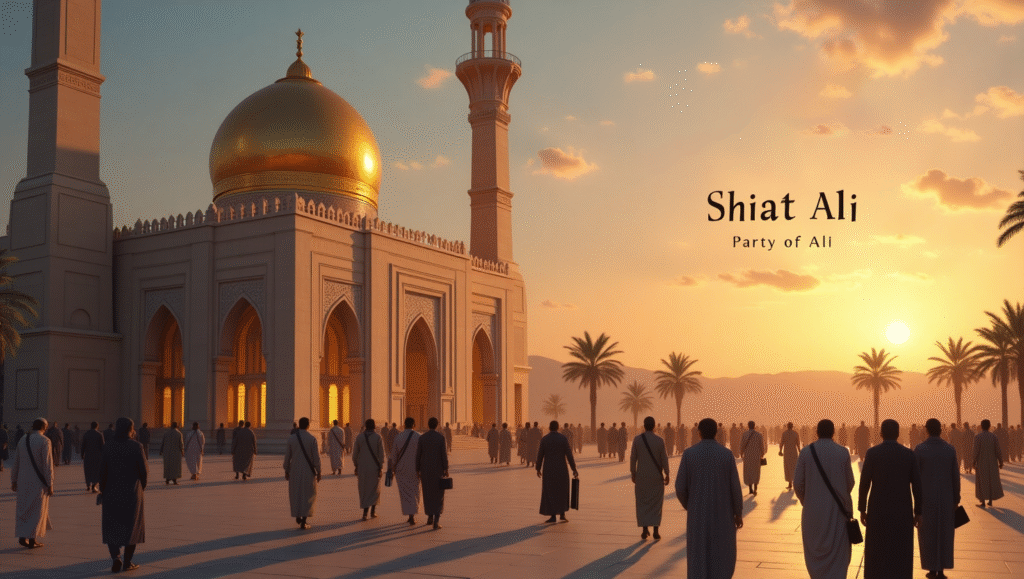What is Shia Islam?
Shia Islam is a branch of Islam that believes the leadership of the Muslim community should have remained within the Prophet Muhammad’s family, specifically passing to his cousin and son-in-law, Imam Ali (a.s). The term “Shia” is derived from “Shiat Ali,” meaning “the party of Ali.”
Historical Roots
After the death of Prophet Muhammad (ص) in 632 CE, a dispute arose regarding who should lead the Muslim community. While the majority accepted Abu Bakr as the first Caliph, Shia Muslims believed that the Prophet had explicitly appointed Imam Ali (a.s) as his successor at the event of Ghadir Khumm. This belief laid the foundation for the Shia sect.
Differences from Sunni Islam
Though both Shia and Sunni Muslims share the core tenets of Islam such as belief in one God, the Prophet Muhammad (ص), prayer, fasting, and pilgrimage, they differ in theological, jurisprudential, and ritual matters. Shia Muslims emphasize the spiritual and political leadership of the Imams, particularly the Twelve Imams, who they believe were divinely appointed.
Core Beliefs of Shia Muslims
Shia Islam is built on the same five pillars of Islam as Sunni Islam but adds the concept of Imamate as a central tenet. The following are some of the primary beliefs in Shia theology:
1. Tawheed (Oneness of God)
Shia Muslims believe in the absolute oneness and uniqueness of Allah.
2. Adalah (Justice of God)
God is just and fair, and all His actions are rooted in justice.
3. Nubuwwah (Prophethood)
The belief in the prophethood of Muhammad (ص) as the final messenger of God.
4. Imamat
Unique to Shia Islam, this is the belief that after the Prophet, spiritual and temporal leadership was handed over to the Imams, starting with Imam Ali (a.s). These Imams are considered infallible and divinely appointed.
5. Qayamat (Day of Judgment)
A belief in life after death, resurrection, and divine judgment.
The Ahl al-Bayt
The term “Ahl al-Bayt” refers to the family of the Prophet Muhammad (ص), particularly his daughter Fatima (s.a), Imam Ali (a.s), and their descendants. Shia Muslims hold the Ahl al-Bayt in the highest esteem, considering them models of piety, knowledge, and leadership.
Importance of Imam Ali (a.s)
Imam Ali (a.s) is regarded as the first Imam and the rightful successor to the Prophet. Known for his wisdom, bravery, and deep spirituality, his teachings form the foundation of Shia jurisprudence and theology. [Read more: The Role of Imam Ali in Shia Islam]
Shia Muslim Practices and Rituals
Shia Islam encompasses rich rituals and acts of worship that reflect its devotion to the Ahl al-Bayt and the remembrance of historical events that shaped the faith.
Daily Practices
- Salat (Prayer): Shia Muslims pray five times a day, often combining Dhuhr with Asr and Maghrib with Isha.
- Sawm (Fasting): Observed during Ramadan, with added emphasis on spiritual reflection and acts of charity.
- Zakat and Khums: In addition to Zakat, Shia Muslims also pay Khums (20% of surplus income) for religious and community welfare.
Pilgrimage (Ziyarat)
While Hajj is obligatory, Shia Muslims also perform Ziyarat — visiting the shrines of the Imams, particularly in Karbala (Iraq), Najaf (Iraq), and Mashhad (Iran). These pilgrimages hold immense spiritual value. [Related article: Islamic Pilgrimage: Importance of Ziyarat in Shia Islam]
Ashura and Muharram
Ashura, the 10th day of Muharram, marks the martyrdom of Imam Hussein (a.s), the grandson of the Prophet, in the Battle of Karbala. Shia Muslims commemorate this day with mourning processions, recitations of elegies (Marsiya and Noha), and reenactments of the Karbala tragedy.
Eid al-Ghadir
This Shia-specific celebration marks the Prophet’s declaration of Imam Ali (a.s) as his successor at Ghadir Khumm. It’s a joyful occasion with gatherings, speeches, and expressions of allegiance to Imam Ali (a.s).
The Role of the Imams in Shia Islam
The Twelve Imams are considered the spiritual and temporal successors of the Prophet in Shia theology. Each Imam provided moral and religious guidance to the community during their time.
Key Responsibilities:
- Spiritual Leadership: Imams guide believers in matters of faith, ethics, and jurisprudence.
- Moral Examples: Their lives exemplify patience, sacrifice, and justice.
- Divine Authority: Shia Muslims believe the Imams receive divine knowledge (Ilm al-Ladunni) that makes them infallible in religious matters.
The final Imam, Imam Mahdi (a.j), is believed to be in occultation and will return to establish justice on Earth.
Shia Muslim Community and Global Presence
Shia Muslims form about 10-15% of the global Muslim population. They are predominantly found in:
- Iran: The largest Shia-majority country.
- Iraq: Home to the holy cities of Najaf and Karbala.
- Lebanon: Where groups like Hezbollah have roots in Shia ideology.
- Pakistan, India, Bahrain, Azerbaijan: With substantial Shia populations.
Cultural and Religious Identity
Despite being a minority in many countries, Shia Muslims have preserved their rich cultural heritage, religious festivals, and community gatherings.
Challenges and Resilience
In some regions, Shia communities face discrimination or persecution. However, their resilience and unity have allowed them to continue practicing and spreading their beliefs globally through educational institutions, media, and community centers.


